- Home
- Harlan Ellison
Angry Candy Page 2
Angry Candy Read online
Page 2
And then Richelieu got up and — gently but firmly — debunked what we had said. With oleaginous sincerity, he told his flock the same fable all over again, pushing the philosophy of that particular House of God and House of Men.
When the ceremony was ended, we three stood alone for a time, and no one came to speak to us, except for one woman who approached us and, smiling as Richelieu had been smiling, advised us that Emily was above, and she hoped and prayed for us that we would be able to let the sun into our hearts. She meant well, but I wanted to slug her.
And we walked back to the car, and we got in and drove away from Redondo Beach; and there hasn't been a day since February of 1986 that I haven't thought about Emily, and how much I miss my friend.
This is the twenty-second or -third or -fifth book of stories I've done. I'd like to be more precise, but what with "retrospectives" and larger collections broken in half for British publication, and suchlike, it's 22 or 23 or 25. In that neighborhood. And most of them seem to have a thread running through them unifying the diverse tales. One book was mostly about love, and the forms it takes. Another was made up of stories written during the Years of the Movement in the late '6os–early '70s, stories about social conscience and civil rights and censorship and working to stop the Viet Nam War. Another collection contained stories about the "new gods" we worship: the gods of neon, freeways, street violence, big money.
I never seem to plan these unifying aspects.
They just happen, and I'm more surprised than anyone that the linkages exist. Till now, I've always found that extra added attraction a salutary gift to give the reader. Till now.
With some trepidation I discover, now that ANGRY CANDY is an assembled artifact, that in large measure it deals with death. Enough to scare away the casual reader.
If it does any good, I never planned it to be so.
But even though I thought, during the recent years in which I've written these seventeen works, that they were about the things I've usually worried and chewed and tried to understand — the nature of courage, the parameters of genuine friendship, what it takes to be strong in a world that prefers we be weak and frightened — when I looked over the totality here assembled, the unifying thread was the end of life, personal and universal. I never planned it to be so.
When the book was completed, there were sixteen stories here. After I perceived the thread, I knew I had to write one more. So I wrote "The Function of Dream Sleep" maybe possibly to tie it all together. Because what I realized, what this book brought home to me, was how much unchanneled and free-floating pain I was suffering . . . from the deaths of my friends.
It started getting really bad in April of 1985, when Larry Shaw died. You'd have liked Larry a lot. Apart from being one of my oldest friends, he was the guy who bought my first story back in 1955. Once he wrote an article or a story or something and signed the pseudonym "N.R. DeMexico" to it. I asked him what the N.R. stood for. He said, "Not Really."
There had been the usual number of passings any adult gets in his/ her life. Both my parents were long gone. Phil Seuling died unexpectedly. But they went away with enough time in between so I could catch my breath. But in April of '85 it started getting awful. Old Tom Sherred died, wonderful T.L. Sherred who had written only a handful of yarns, but each one was a radiant gem, polished and shining. He was a gentle, sweet man with a mordant sense of humor; and it was only about two weeks after Larry that I got the news on Tom. And the beginning of the second week in May, Ted Sturgeon died.
And I began the almost full-time job of writing obituaries for major pieces of my past. Here's what I said about Ted:
• • •
It began raining in Los Angeles tonight at almost precisely the minute Ted Sturgeon died in Springfield, Oregon. Edward Hamilton Waldo would have cackled at the cosmic silliness of it; but I didn't. It got to me; tonight, May 8th.
It had been raining for an hour, and the phone rang. Jayne Sturgeon said, "Ted left us an hour ago, at 7:59."
I'd been expecting it, of course, because I'd talked to him — as well as he could gasp out a conversation with the fibrosis stealing his breath — early in March, long distance to Haiku, Maui, Hawaii. Ted had written his last story for me, for the Medea project; and we'd sent him the signature plates for the limited edition. He said to me, "I want you to write the eulogy."
I didn't care to think about that. I said, "Don't be a pain in the ass, Ted. You'll outlive us all." Yeah, well, he will, on the page; but he knew he was dying, and he said it again, and insisted on my promise. So I promised him I'd do it, and a couple of weeks ago I came home late one night to find a message on my answering machine: it was Ted, and he'd come home, too. Come home to Oregon to die, and he was calling to say goodbye. It was only a few words, huskily spoken, each syllable taking it out of him, and he gave me his love, and he reminded me of my promise; and then he was gone.
Now I have to say important words, extracted from a rush of colliding emotions. About a writer and a man who loomed large, whose faintest touch remains on everyone he ever met, whose talent was greater than the vessel in which it was carried, whose work influenced at least two generations of the best young writers, and whose brilliance remains as a reminder that this poor genre of dreams and delusions can be literature.
Like a very few writers, his life was as great a work of artistic creation as the stories. He was no myth, he was a legend. Where he walked, the ether was disturbed by his passage.
For some he was the unicorn in the garden; for others he was a profligate who'd had ten hot years as the best writer in the country, regardless of categorizations (even the categorization that condemned him to the ghetto); for young writers he was an icon; for the old hands who'd lived through stages of his unruly life he was an unfulfilled promise. Don't snap at me for saying this: he liked the truth, and he wouldn't care to be remembered sans limps and warts and the hideous smell of that damned grape-scented pipe tobacco he smoked.
But who the hell needs the truth when the loss is still so painful? Maybe you're right: maybe we shouldn't speak of that.
It's only been an hour and a half since Jayne called, as I write this, and my promise to Ted makes me feel like the mommy who has to clean up her kid's messy room. I called CBS radio, and I called the Herald-Examiner, and that will go a ways toward getting him the hail-and-farewell I think he wanted, even though I know some headline writer will say SCI-FI WRITER STURGEON DEAD AT 67.
And the kid on the night desk at the newspaper took the basics — Ted's age, his real name, the seven kids, all that — and then he said, "Well, can you tell me what he was known for? Did he win any awards?" And I got crazy. I said, with an anger I'd never expected to feel, "Listen, sonny, he's only gone about an hour and a half, and he was as good as you get at this writing thing, and no one who ever read The Dreaming Jewels or More Than Human or Without Sorcery got away unscathed, because he could squeeze your heart till your life ached; and he was one of the best writers of the last half a century; and the tragedy of his passing is that you don't know who the fuck he was!" And then I hung up on him, because I was angry at his ignorance, but I was really angry at Ted's taking off like that, and I'm angry that I'm trying to write this when I don't know what to write, and I'm furious as hell that Ted made me promise to do this unthinkable thing, which is having to write a eulogy for a man who could have written his own — or any other damned thing — better than I or any of the rest of us could do it.
Theodore Sturgeon, 1918–1985. You begin to see the pattern emerging? Death was intruding in a way I'd never permitted it to obsess me. One cannot write about what Faulkner called "the human heart in conflict with itself," the only thing, he said, that was worth the blood and sweat and anguish of writing, without dealing with death. And anyone who has read my work knows I never shirked that part of the job. There is death in plenitude in my stories. But I was starting to learn that there is death . . . and there is death. The kind one uses as a story element, and the kind t
hat wakes you shivering in the night, listening to the wind carrying away the answers.
The necrology began growing. Funny Jack Gaughan, the artist; and Bernie Wolfe, who was one of the greatest writers this country produced and whose books are almost all out of print, and most of you have never even heard his name, much less read a word he wrote, which is the worst punishment after death you can visit on a writer; and dear old Walter Gibson, who created The Shadow; and the brilliant and fiery Howard Rodman, who taught me to fight the television censors, who said to me when I was wet behind the ears in Hollywood, "When they want to change your words, don't let them send you to lawyers, don't let them run their rationalizations, don't let them scare you . . . hit them."
And that was only December.
But do you see what was happening? I was getting angrier and angrier. I couldn't stop it. I'd go to bed angry, and get up angrier the next morning. Death was consuming me. Nothing was safe. I was living on the edge of the slide area.
Ron Hubbard and Emily went in January of '86. I hadn't seen Ron in decades, but we'd exchanged a few letters; and despite the looneytunes scene his Dianetics and Scientology had become, he was always still just Ron Hubbard, who'd written To the Stars and Final Blackout and Fear and Typewriter in the Sky and Slaves of Sleep, all of which great pulp fiction I can still reread with pleasure; and he was not some sort of mysterious recluse with a worldwide following of dippy "clears" who are so scared someone will let light into their cultish religion that they sue people who talk in their sleep, one supposes, rather than suffer any negative comment. He was just Ron, and I kinda liked him, mostly because he wrote well, and I never felt he took all that Scientology nonsense seriously but knew how to make a good buck, and he liked me, and . . . well, he was a friend who died. As Emily was a friend who died.
Then, all in one month, the very next month through which I was reeling at Emily's sudden death . . . Bob Mills, who had been my agent and friend for more than twenty years. . . just at that moment in his long life when he'd gotten out of the literary game and had come to California to retire and start to enjoy his years without having to babysit the lives of a buncha writers who always needed an advance on some story they'd sold . . . and Judy-Lynn del Rey, who had been very good and very encouraging to me for a long time till we had a falling out . . . and DeeDee Lavender . . . who died leaving Roy all alone . . . and I remembered all the good times we'd had when I was a teenaged science fiction fan back in Ohio in the early Fifties . . . and then, in a moment, Frank Herbert was gone.
Oh, I writ a real eloquent 3,000 words about Frank, you can be sure. Hell, I can almost read that obit today without falling apart. I'm getting good at this death business. Maybe I'll join a M. A.S.H. unit. Just shovel the dead at me, I can take it, sarge.
In April, I was half an hour late to the deathbed of Manly Wade Wellman. And again had to sit down to write of it:
And now Manly is gone. I know it's the way, the way it's always been; but my god how it goes on and on till we cannot bear it a moment longer. Now Manly, gone: along with Ted and Frank, Bob Mills and Judy-Lynn, John Ciardi and Ron Hubbard, Jerry Paris and Howard Rodman, DeeDee Lavender and dear Emily Austin. And more of whom we've heard . . . soon, too soon.
Like you, I fear to lift the receiver when the phone rings, I fear what dread announcement will come next.
This one was just a trifle more awful for me than the unbearable pains of the other old friends who have left in the past few months. I was in Chapel Hill to speak at the university, having accepted the engagement chiefly because it provided a chance to spend some time with Manly and Frances. Manly's fall in June of 1985, and the resultant loss of his legs due to gangrene in September, had left that fine man in a terrible state of depression. We had talked several times, and Karl Edward Wagner had told me everyone was working very hard at getting Manly to rally, to try and make a comeback. They said a visit from someone Manly and Frances felt affection for, might do some good. And so I came to Chapel Hill.
I missed him by less than an hour. I had spoken the night before, and to my shame I dawdled. I am always late, and most of the time it doesn't matter. This time it mattered very much. When Danny Reid and I drove up to the house, Karl came to meet us. He was crying. "You missed him by half an hour," he said. I have to live with that one.
But he and Frances had wanted some Chinese food, and I'd sent some over earlier that day with Eva McKenna; and she told me he had been eating my Chinese food just a little while before he had the cardiac arrest. Eva said he liked scallops and had enjoyed it. Only that slender thread permits me to bear the guilt, because I fear I have no more tears in me. It has been too terrible a year.
So there will be no more stories of John the Ballad Singer and his guitar with the silver strings, no more tales of John Thunstone, no more miraculous prose, no more sly and sensitive reminders that we are all carried on the wind by forces we cannot control. Manly's voice is silenced, and the books remain, which is some consolation but not much. And another empty place in our lives is fitted into the jigsaw scheme of our days.
Karl was closer, and he will write of Manly's charm and grace and goodwill and courage and overwhelming humanity; and David Drake and Julie Schwartz and Bob Bloch and Gerry de la Ree and I will have the memories of his kindnesses, the pure treasure of having been permitted to know him; but for those of you who never knew him, who know only the words he wrote, for you the loss is greater. We have the stories, but we also had the privilege of touching his hand and seeing his smile.
The recollection of meeting him in Chicago, the letters we exchanged, that now-terribly-important sack of Chinese food . . .these become the urgent inconsequentialities that I can share with you in tribute to Manly. Did I ever tell you that his was the very first science fiction name I ever knew? Yes. It was on the cover of an issue of Startling Stories that I bought in the Forties, before I even knew there was something called scientifiction. It was the byline under a story titled "Twelve Hours to Live" but that was a silly proofreader's error, because inside the magazine that Hall of Fame reprint was bylined Jack Williamson. But Manly's was the first name I remembered.
What I tell you in memoriam is trivial. It is here to establish a fragile link with a man I admired and enjoyed, a man who expressed affection for me, which was reciprocated in full measure. It is not significant data; and it is as self-serving as anything any of us says about someone who is gone, whom we miss. The words are for the living. Manly knew who loved him, he doesn't need this affirmation. We do it for ourselves, perhaps to remind ourselves that we haven't been in touch with the few who matter to us, we haven't written that letter or made that phone call.
The wind blows. Don't be half an hour late.
• • •
Nor did it stop. The exquisitely witty wife of my friend George Kirgo, dear Terry, died in April, soon after Manly. And then Tom Scortia, who had literally saved my ass from being courtmartialed back in 1958 when I was waging my PFC war with the U. S. Army at Fort Knox, he died. He called a week or so before the end, to tell me, and to say he was sorry we'd had such coolness between us for the last ten years. He said he wanted to died with us as friends again. Oh, that was a swell telecon, that was. And in May, it was Mike Hodel:
First, and always, there was that voice. For more than fifteen years, if one lived in Los Angeles, tuning in to 90.7 on the FM dial, one heard that voice. Warm and kind and instantly the sound of a friend speaking to no one but you. Every Friday night from ten o'clock till midnight on KPFK, Pacifica's station in the City of the Angels, there was Mike Hodel hosting the (literally) world-famous Hour 25 program.
It remains the longest-running science fiction show on radio; and though imitators came and went, it remains the only show of its kind in America. A forum and meeting place for writers and fans, publishers and readers of the genre.
For fifteen years there was no writer of significance who was not interviewed by Mike, no topic of interest he did not address, no cause of
merit he did not champion. For a decade and a half, Hour 25 was the foremost forum providing publicity for writers coming into L.A. to promote their books. Mike Hodel took it as a personal responsibility to keep people reading. His anti-illiteracy campaign, under the title READ/SF, fought the forces of obscurantism and illogic by providing audio cassettes of sf writers reading their stories. And on the air, week after week, he brought serious thinkers and noble madmen to the microphpne in that tiny, squalid control booth at KPFK... to champion the space program, to recommend new writers whose work had reached him, to feed what he called "the group mind." He was the voice of reason and decency and friendship, for those who needed a community of like souls.
He had no enemies. To make enemies one must be suspected of having unkind thoughts or petty purposes. Mike was free of such thoughts and purposes; and so he was the recipient of a free-floating affection that all of us envy but seldom achieve.
In January of this year he seemed to have come down with a case of the flu he could not shake. So his wife, Nancy, a registered nurse, took him into the hospital for X-rays. They discovered thoracic cancer, and subsequently learned it had metastasized in the brain. Malignant melanoma, the worst possible scenario, became the reality. Mike knew, and with the grace and kindness that were his trademarks, he set about ordering his last days.
The program was his chief concern, and he took steps to insure its continued life, even if his personal existence was to be ended. He has left Hour 25 in the hands of Terry Hodel and his long-time friend, Demon Engineer Burt Handelsman, and this writer. The show will continue, unaltered, save it will now be known at Mike Hodel's Hour 25. The work that Mike carried on for fifteen years will continue.
He died at 9:27 P.M. on Tuesday, May 6th, in room 4802 of Cedars-Sinai Medical Center in Los Angeles. The disease came and took him so quickly that it permitted him to spend his last few months with dignity. He even hosted the show two weeks before his death, though the magnificent voice was furry and thin. But he did it. And he even tried to spare his listeners the pain of knowing he was about to leave. He mentioned casually that he had a small medical problem, about which many of them had heard; but they were not to worry; it wasn't anything very important or troublesome.

 Repent, Harlequin! Said the Ticktockman
Repent, Harlequin! Said the Ticktockman Broken Glass
Broken Glass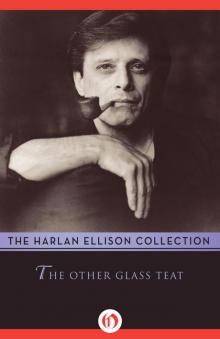 Other Glass Teat
Other Glass Teat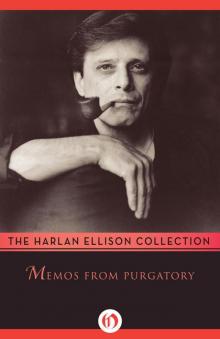 Memos From Purgatory
Memos From Purgatory I Have No Mouth and I Must Scream
I Have No Mouth and I Must Scream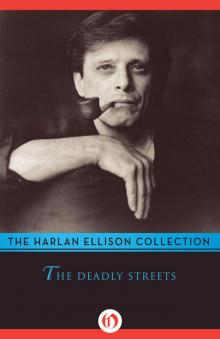 The Deadly Streets
The Deadly Streets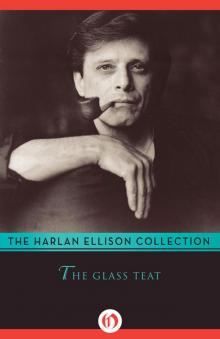 The Glass Teat
The Glass Teat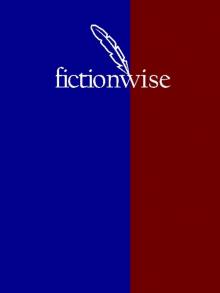 Paingod and Other Delusions
Paingod and Other Delusions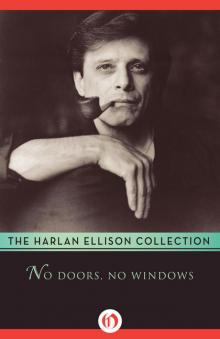 No Doors No Windows
No Doors No Windows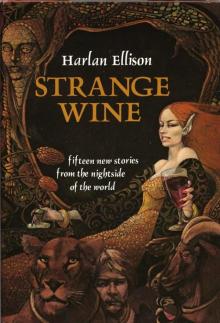 Strange Wine
Strange Wine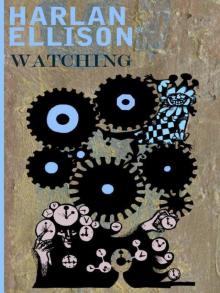 Harlan Ellison's Watching
Harlan Ellison's Watching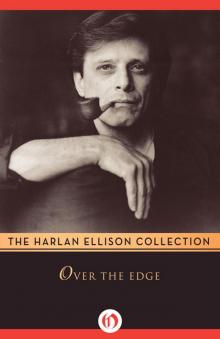 Over the Edge/An Edge in My Voice
Over the Edge/An Edge in My Voice Troublemakers: Stories by Harlan Ellison
Troublemakers: Stories by Harlan Ellison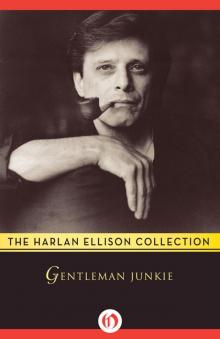 Gentleman Junkie and Other Stories of the Hung-Up Generation
Gentleman Junkie and Other Stories of the Hung-Up Generation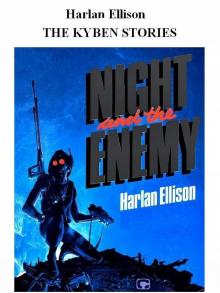 The Kyben Stories
The Kyben Stories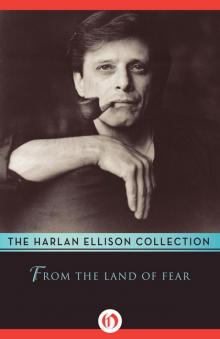 From the Land of Fear
From the Land of Fear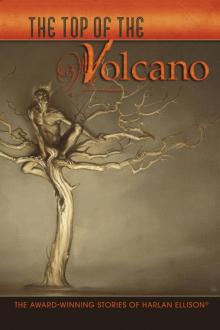 The Top of the Volcano: The Award-Winning Stories of Harlan Ellison
The Top of the Volcano: The Award-Winning Stories of Harlan Ellison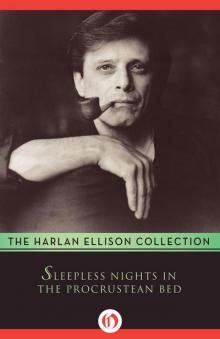 Sleepless Nights in the Procrustean Bed
Sleepless Nights in the Procrustean Bed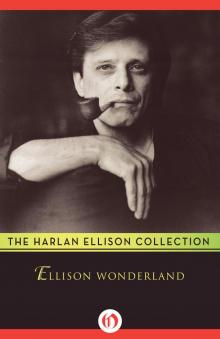 Ellison Wonderland
Ellison Wonderland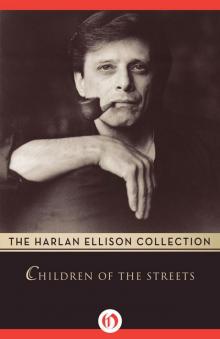 Children of the Streets
Children of the Streets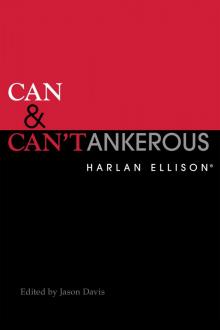 Can & Can'tankerous
Can & Can'tankerous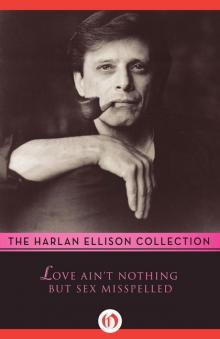 Love Ain't Nothing but Sex Misspelled
Love Ain't Nothing but Sex Misspelled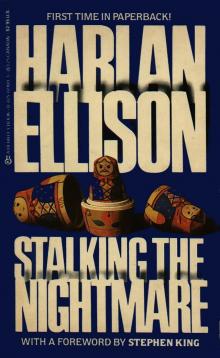 Stalking the Nightmare
Stalking the Nightmare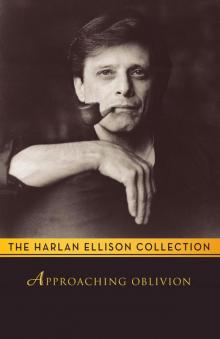 Approaching Oblivion
Approaching Oblivion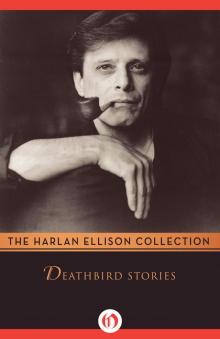 Deathbird Stories
Deathbird Stories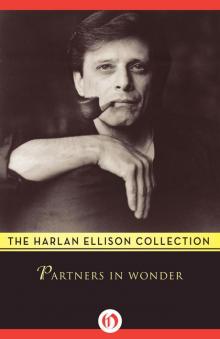 Partners in Wonder
Partners in Wonder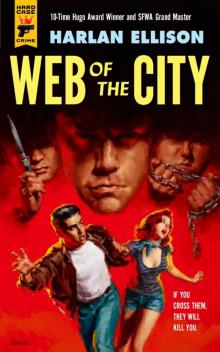 Web of the City
Web of the City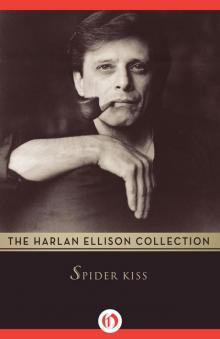 Spider Kiss
Spider Kiss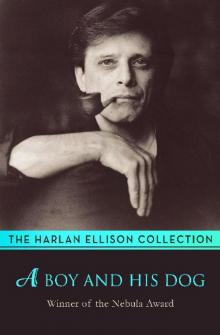 A Boy and His Dog
A Boy and His Dog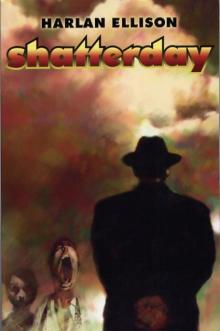 Shatterday
Shatterday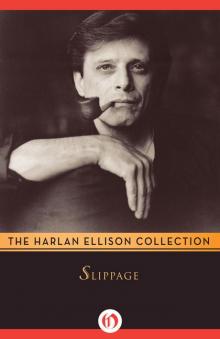 Slippage: Previously Uncollected, Precariously Poised Stories
Slippage: Previously Uncollected, Precariously Poised Stories Repent, Harlequin! Said the Ticktockman
Repent, Harlequin! Said the Ticktockman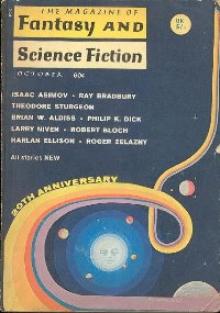 Come to Me Not in Winter's White
Come to Me Not in Winter's White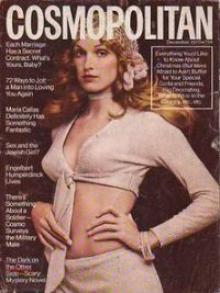 The Song the Zombie Sang
The Song the Zombie Sang The Other Glass Teat
The Other Glass Teat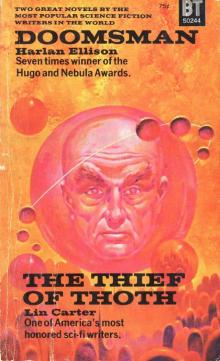 Doomsman - the Theif of Thoth
Doomsman - the Theif of Thoth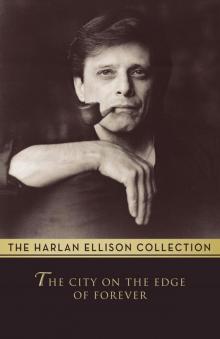 The City on the Edge of Forever
The City on the Edge of Forever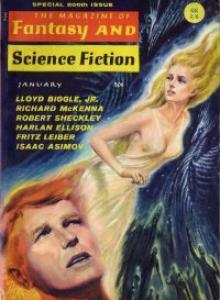 I See a Man Sitting on a Chair, and the Chair Is Biting His Leg
I See a Man Sitting on a Chair, and the Chair Is Biting His Leg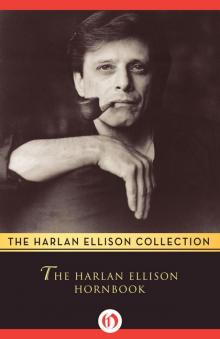 The Harlan Ellison Hornbook
The Harlan Ellison Hornbook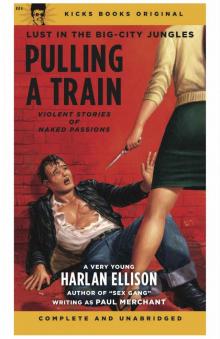 Pulling A Train
Pulling A Train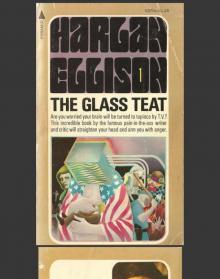 The Glass Teat - essays of opinion on the subject of television
The Glass Teat - essays of opinion on the subject of television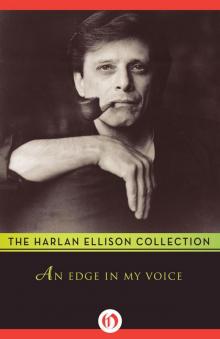 An Edge in My Voice
An Edge in My Voice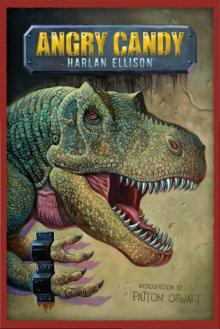 Angry Candy
Angry Candy Troublemakers
Troublemakers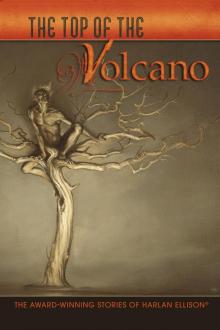 The Top of the Volcano
The Top of the Volcano Over the Edge
Over the Edge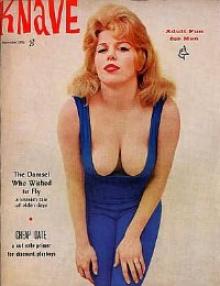 Survivor #1
Survivor #1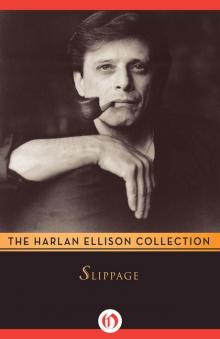 Slippage
Slippage